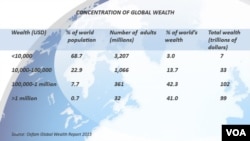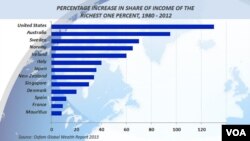The human rights group Oxfam reported that the wealth of the world's 85 richest people is equal to that of the poorer half the world's population.
Oxfam released a study on global inequality Monday, ahead of a meeting this week of government and business leaders at the World Economic Forum in Davos, Switzerland.
The report said wealthy elites have used their political power to get lower tax rates, hide wealth offshore, and otherwise serve their own interests, to the disadvantage of those at lower income levels.
The report lists financial deregulation, tax havens and secrecy, and "cuts or underinvestment" in public services as examples of such political maneuvering. It said the effect of these policy changes is not only to concentrate wealth and political influence in higher income brackets but to ensure it stays there for the next generation.
Oxfam said that in the past decade, the number of billionaires in India has increased tenfold, while in Europe austerity measures mainly affect the middle and lower classes. Meanwhile, in Africa, global corporations exploit their political influence to avoid taxes, reducing government resources to fight poverty.
Oxfam is calling on those business leaders and government delegates attending the World Economic Forum to support government programs that strive to help underserved middle and lower income levels, support development of fair wages, and crack down on tax dodging and financial secrecy.
It also called on participants to "agree to a global goal to end extreme inequality in every country," as part of the post-2015 negotiations.
Oxfam released a study on global inequality Monday, ahead of a meeting this week of government and business leaders at the World Economic Forum in Davos, Switzerland.
The report said wealthy elites have used their political power to get lower tax rates, hide wealth offshore, and otherwise serve their own interests, to the disadvantage of those at lower income levels.
The report lists financial deregulation, tax havens and secrecy, and "cuts or underinvestment" in public services as examples of such political maneuvering. It said the effect of these policy changes is not only to concentrate wealth and political influence in higher income brackets but to ensure it stays there for the next generation.
Oxfam said that in the past decade, the number of billionaires in India has increased tenfold, while in Europe austerity measures mainly affect the middle and lower classes. Meanwhile, in Africa, global corporations exploit their political influence to avoid taxes, reducing government resources to fight poverty.
Oxfam is calling on those business leaders and government delegates attending the World Economic Forum to support government programs that strive to help underserved middle and lower income levels, support development of fair wages, and crack down on tax dodging and financial secrecy.
It also called on participants to "agree to a global goal to end extreme inequality in every country," as part of the post-2015 negotiations.







